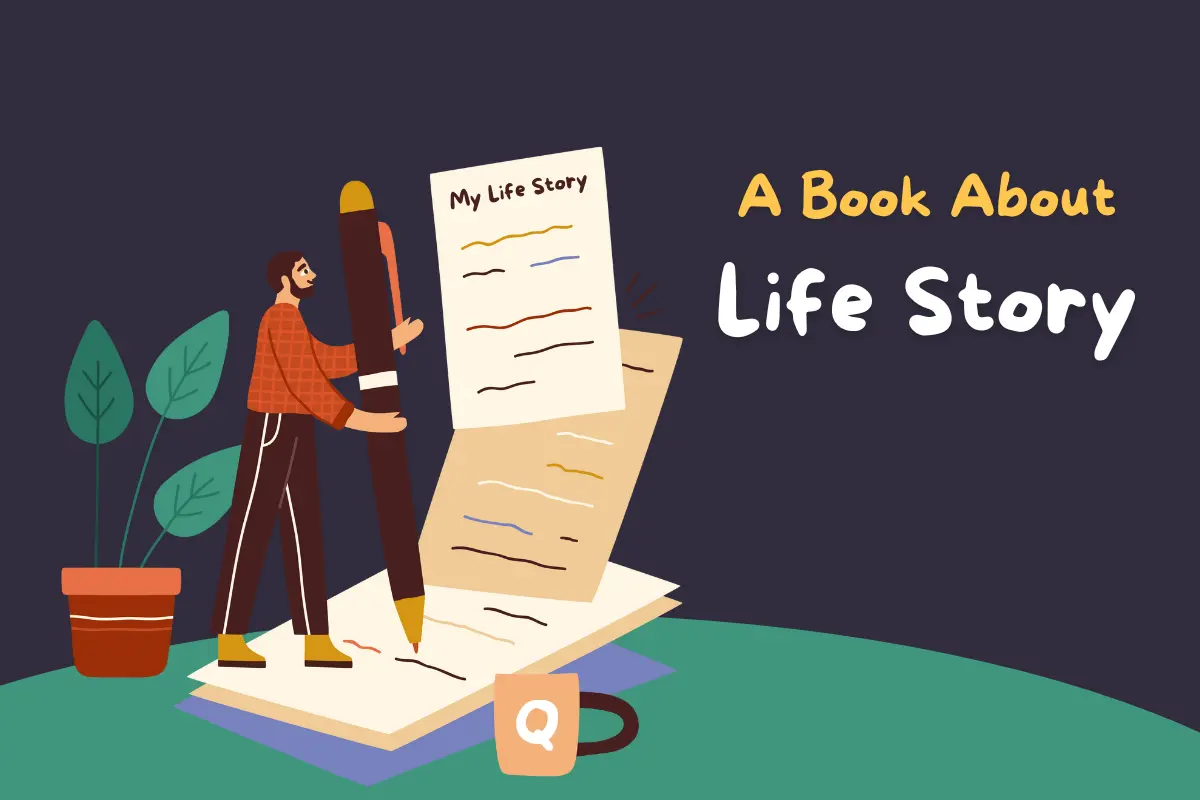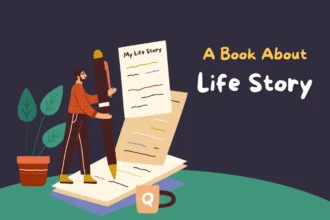How to Write a Book About Your Life: 8 Powerful Tips with Examples
Do you want to know how to write a book about your life? This article assist you in writing a book about your life story. Let's know the steps to start.

Rijvi Ahmed
Last updated on Mar 14th, 2024

When you click on affiliate links on QuillMuse.com and make a purchase, you won’t pay a penny more, but we’ll get a small commission—this helps us keep up with publishing valuable content on QuillMuse. Read More.
Table of Contents
Everyone indeed has a unique story to tell, and some people have a life story worth sharing with others. But How to Write a Book About Your Life? If you’re one of those people who have considered writing an autobiography or memoir but are still trying to figure out where to start and how to write your life story, then you’ve come to the right place.
Writing a book about your life can be overwhelming, but with the right guidance, it can also be a rewarding and fulfilling experience.
In this guide “How to Write a Book About Your Life: 8 Powerful Tips with Examples” I will provide tips and examples to help individuals write their life stories. It aims to give guidance on how to narrate one’s life story in an engaging and impactful way.
Before diving into the writing process, it’s important to understand the difference between an autobiography and a memoir.
An autobiography is a chronological account of your entire life story, while a memoir typically focuses on a specific theme or event in your life. And today I am here to tell you How to Write Your Life Story with tips and great examples.
So, whether you want to write about your entire journey or just a particular aspect, there are plenty of tips and examples to help you get started.
Reasons to Write a Book About Your Life
Ever thought about penning a book about your life? Trust us, there are countless reasons why it’s worth considering. We’re willing to bet that your life is brimming with fascinating tales that deserve to be told!
That’s a valid point. People who have had unique or non-traditional life experiences might choose to write an autobiography to share their stories with others. It could be anything from growing up in a cult or living with nomads to having famous parents or living in a war zone. Writing an autobiography can help individuals process their experiences and also provide insight and inspiration to others.
Many people choose to write a memoir as a way to explore a specific theme or period in their life that they feel is worth sharing with others.
It could be anything from overcoming addiction or illness to achieving a remarkable goal or reaching a turning point in their life. Writing a memoir can also be a therapeutic process, allowing individuals to reflect on their experiences and find meaning in their journey. Ultimately, whether you choose to write an autobiography or memoir, your story has the power to inspire and connect with others.
There’s no deficiency of reasons why somebody might select to share their life’s story with the world. Points of journals and autobiographies are endless.
If you’ve got a story where you’ve learned something worth sharing, otherwise you have an especially interesting life, at that point, you’ve got an extraordinary reason to type in a book approximately your life.
If you do not know how to write a book about your life, then continue with me and I will tell the most important tips with examples.
Related: 12 Creative Writing Tips for Beginners to Be Expert
Some Examples of Autobiographies and Memoirs
Are you still not convinced you should write a book?
Let’s check out some great examples of autobiographical writing to inspire you.
5 Great Memoirs and Autobiographies:
- An Autobiography by Agatha Christie
- Narrative of the Life of Frederick Douglass, an American Slave
- Bossypants by Tina Fey
- Open: An Autobiography by Andre Agassi
- I Talk Pretty One Day by David Sedaris
1. An Autobiography by Agatha Christie
Agatha Christie’s life was just as intriguing as the mysteries she wrote. She was a private person who kept much of her personal life a secret, including her disappearance for a time.
Her autobiography was released posthumously, providing insight into her life as a writer and her experiences traveling the world. Despite not delving into the details of her disappearance, the autobiography remains a compelling read for fans of her writing and those interested in the life of a remarkable author.
The book provides insight into her life as a writer and her experiences traveling the world, but it doesn’t delve into the details of her disappearance. This event only adds to the intrigue surrounding her life, as she kept some things a mystery.
Nonetheless, her autobiography remains a compelling read for fans of her writing and those interested in the life of a remarkable author.
2. Narrative of the Life of Frederick Douglass, an American Slave,
Frederick Douglass’s autobiography, “Narrative of the Life of Frederick Douglass, an American Slave,” is a powerful account of his life as a slave, his escape to freedom, and his activism.
Born into slavery in 1818, Douglass managed to learn to read and write despite being forbidden to continue his education. His story is an inspiring example of the power of determination to overcome seemingly insurmountable obstacles. If you’re looking for a thought-provoking read, “Narrative of the Life of Frederick Douglass, an American Slave” is a must-read.
Absolutely! Douglass’s narrative is a passionate and often graphic account of his life as a slave and his fight for freedom and equality. His dedication to achieving a better life for himself and other Black people in 19th-century America is evident throughout the book, and his courage in the face of adversity is truly inspiring. The narrative is a powerful reminder of the enduring legacy of slavery and the ongoing struggle for justice and equality.
3. Bossypants by Tina Fey
Tina Fey’s memoir, Bossypants, is a hilarious and insightful read that offers a glimpse into the life of the talented writer and comedian. The book touches on Fey’s childhood, early career, and her thoughts on societal expectations for women and girls.
Through her witty humor, Fey manages to navigate the toughest parts of life, and her memoir reflects that. It’s a relatable and poignant read that’s sure to resonate with many of her fans. It’s no wonder that it topped the bestseller charts upon its release.
4. Open: An Autobiography by Andre Agassi
It’s incredible how Andre Agassi’s life has been full of ups and downs.
His autobiography, “Open: An Autobiography” is a fascinating read that delves into his early tennis training, his difficult childhood, his rise to fame in the tennis world, his complicated relationships with Barbara Streisand and Brooke Shields, and his comeback at the 1999 French Open.
The book offers a vulnerable account of his life as an iconic athlete, and it’s a must-read for sports fans and anyone interested in Agassi’s fascinating life story.
5. Me Talk Pretty One Day by David Sedaris
David Sedaris is a popular memoirist known for his humorous and honest writing style. I Talk Pretty One Day is a hilarious and relatable collection of essays about his experiences growing up as a queer man and navigating life in France with his partner.
It’s a great read for anyone who enjoys memoirs that don’t take themselves too seriously.
How to Start Writing a Book About Your Life
The first step in learning how to write a book about your life is to find your starting point. But where do you begin? You have a whole life full of interesting stories.
The most important and first step is to start with a basic chronology. Make a timeline of your life. If you’ve already selected a topic or theme, focus on elements in your life that support that topic. These might be the lead-up to an event, the event itself, or the aftermath.
You might also talk about events that shaped your character or taught you a lesson you needed for this theme.
If you haven’t decided on a general topic yet, or if you want to write a biography instead of a memoir, try making a list of your entire life now. It starts with the main events that take place. Be as detailed as possible. Then look for underlying themes and messages. You are still writing a book, after all, and all books need themes.
Possibly the topic is mending from childhood injury or appearing the esteem of difficult work and devotion. It may well be centered on how connections changed you or what you’ve learned from rehashed destitute choices.
As you study your life, you’ll notice patterns. These patterns will help shape the overall narrative of your life story.
Tips on How to Write a Book About Your Life
When it comes to how to compose a book around your life, there’s no one adjusted way to do it. But there are tips you’ll utilize to direct you as you begin composing.
You may compose almost difficult, regularly dim, things in a book almost your life. Composing your life story can be mending, but on the off chance that returning to past injury is as well overpowering, it would be ideal if you reach out to a proficient or somebody you believe for offer assistance. Your book can hold up.
Once you’re prepared to begin composing your life story, here are eight tips to assist you along the way.
1. Writing Notes or Brainstorming before Writing the Book
It may be an extraordinary way to begin with personal composing. You’ve lived a wealthy life full of numerous occasions. It can be difficult to organize your contemplations. Spend a little time free composing approximately your life.
Free composing may be a way to sit down and let the words stream. There’s no structure or provoke. Maintain a strategic distance from the encouragement to alter your pre-writing. Once you start writing, you’ll find that you have a lot more material to write about than you previously thought.
It’s important to trust the pre-writing process when starting to write your life story. This method allows your mind to freely explore and connect different events and people in your life, potentially revealing new insights and perspectives that you may not have considered before. By not judging your pre-writing, you allow yourself the opportunity to learn and grow as you begin to organize your life story in a meaningful way.
So, take the time to sit with the messages and lessons that arise during this process, and trust that they will guide you toward a unique and impactful narrative.
2. Research Your Life with Attention
Research is a crucial aspect of any writing, and autobiographical writing is no exception. Even if you have lived through the events, you may still need to research to ensure that your narrative is accurate and complete.
You may begin by recalling events as you remember them, but you may find that you are missing crucial details. Therefore, you can approach your life story as a journalist would.
You can gather old pictures and diaries to help jog your memory. Additionally, you can interview people who were present during the events you are writing about to gain their perspectives and insights. It may also be necessary to consult primary sources such as newspapers or historical records for background information and context.
By conducting research, you can ensure that your story is as accurate and comprehensive as possible.
Research is indeed a crucial aspect of writing a life story or memoir. It helps you to maintain accuracy and fill in any gaps in your memory. If you’re struggling to remember certain details, such as dates or specific events, research can be a helpful tool to jog your memory.
For instance, if you were part of a sports team in college but can’t recall the details of a particular game, looking through old-school newspapers or talking to former teammates may help you fill in the gaps. Additionally, research can provide you with a fresh perspective on your experiences and help you to view them in a new light.
By conducting thorough research, you can ensure that your story is as factual and accurate as possible, providing readers with a true and engaging account of your life.
3. Following a Narrative Structure for it
When composing a journal or personal history, it’s critical to be beyond any doubt that a person’s life doesn’t continuously take after a culminating story bend.
In any case, taking after an essential story structure can offer assistance to make your book more locked in and impactful. An essential story structure incorporates a presentation, rising activity, climax, falling activity, and determination. You’ll moreover get to incorporate characters, settings, and clashes in your story.
While it may be challenging to find a natural narrative structure in your life, look for natural transitions such as beginnings, high and low points, and endings.
This can help you create a cohesive and compelling narrative for your book. When writing your life story, it’s important to remember that characters play a significant role in your narrative. Whereas you will not have a clear opponent in your individual story, you’ll have supporting characters, such as family individuals, companions, and colleagues, who have played a portion in your life.
It’s crucial to paint these characters as multi-dimensional and not fair props in your story. By doing so, you can create a more engaging and memorable story that resonates with your readers.
Another crucial aspect of writing your life story is highlighting the conflicts and how you overcame them. Every event or moment you include in your book should be treated as a scene, with a problem and a conflict within each. This applies to both genuine and amusing occasions. By highlighting the clashes and how you overcame them, you’ll be able to make a compelling and inspiring story that reverberates along with your perusers.
4. Always Must Be Truthful
It’s important to remember that when writing a memoir or autobiography, honesty is of utmost importance. Readers are looking for the truth, and as an author, you have an ethical responsibility to tell that truth.
It’s crucial not to fabricate events or embellish details to make the story more interesting. If you’re uncertain about certain facts, it’s better to be honest about it and state that this is your recollection of what happened. If you’re tempted to lie to make your story more captivating, it’s best to reassess and find a different angle that doesn’t require dishonesty.
By staying honest, you’ll maintain your credibility as an author and ensure that your story resonates with readers for all the right reasons.
5. Then Fill in Realistic Subtle elements
When writing about your own life, it’s important to remember that memories are not always accurate and can be influenced by time, emotions, and even other people’s recollections. However, you can still fill in the details of your story without embellishing by using your best judgment and doing some research.
One way to fill in the details is to use your knowledge of the time and people involved. For instance, if you can’t remember what your brother was wearing on a particular day, you can use your knowledge of his style and fashion trends at the time to describe a likely outfit. Similarly, you can use your knowledge of your mother’s cooking habits to describe a typical meal she served regularly.
Another way to fill in the details is by doing research and getting input from others. Look at old photos, letters, and other memorabilia to jog your memory and get a better sense of the period and events.
Talk to family members, friends, and other people who were involved in your life at the time to get their perspectives and recollections. By combining your memories with research and other people’s input, you can create a more accurate and vivid picture of your life story.
6. Appear Your Shortcomings
Writing a book about your life is not an easy task, and it requires a great deal of vulnerability. It’s natural to want people to think highly of us, but being too perfect and infallible isn’t honest. As you said, people are messy and flawed, and it’s important to acknowledge that in our writing.
Being honest about our shortcomings and failures can make our stories even more relatable and impactful. Readers want to connect with us as human beings and understand the gritty, unpolished experiences we’ve had. It’s through our vulnerability and honesty that we can truly connect with our audience and inspire them.
So, let’s embrace our imperfections and share our stories with honesty and authenticity. This is what will make our writing truly stand out and resonate with readers. Indeed, our setbacks and mistakes can often define us just as much as our successes. It’s important to embrace them and understand that they are a crucial part of our journey.
Sharing those failures and mistakes can make our life story more interesting and relatable. Readers want to see the struggles and obstacles we faced and how we overcame them. It’s those moments of vulnerability and authenticity that can truly inspire others. So, don’t be afraid to share your disappointments and missteps in your autobiography or memoir. It’s those moments that can make your story resonate with readers and ultimately make it a more impactful read.
7. Now you Should Get the Permission
It’s important to be aware of potential legal issues when writing a true story. One of these issues is obtaining permission to use the real names of people in your life.
It’s important to respect their wishes if they don’t want to be included in your book, even if it means editing out a particular memory or changing their name.
It’s also a good idea to consider changing the names of places or businesses to avoid any possible defamation lawsuits. It’s important to remember that libel and slander are real offenses with serious consequences, so it’s best to avoid using your book as a platform for a smear campaign.
Keep in mind that every person’s story has two sides, even the people you don’t like.
8. Conclusion on a Tall Note
It’s imperative to keep in mind that not each story encompasses a happy finishing. However, people often read memoirs and autobiographies for inspiration.
They want to hear true stories of people overcoming obstacles or defeating the odds. When writing your own story, it’s important to end with a reflection and a message for your readers.
Ending on a high note doesn’t necessarily mean a happily ever after. Instead, it means ending with the lessons you have learned from your own story. Perhaps you’ve learned something about yourself or some universal truth through your life’s events. The end is the perfect opportunity to share these tidbits with your readers.
Reflecting on what led you to write a book about your life is also crucial. There’s a reason you sat down to share your story, and in the conclusion, you can tie everything together.
Think about what you need your perusers to require absent from your recollections and encounters. Your story has the power to inspire and connect with others, so make sure you end on a meaningful note.
Final thoughts
I completely agree that writing a book about your life can be a powerful and intense process, requiring deep introspection and the willingness to confront uncomfortable memories. However, it can also be a rewarding and fulfilling experience, as it allows individuals to share valuable knowledge, insights, and universal truths with the world.
Focusing on these themes and messages can make memoirs and autobiographies valuable and enjoyable to readers. And you are right, everyone has a story worth telling!
How we've reviewed this article
Our content is thoroughly researched and fact-checked using reputable sources. While we aim for precision, we encourage independent verification for complete confidence.
We keep our articles up-to-date regularly to ensure accuracy and relevance as new information becomes available.
- Current Version
- Mar 14th, 2024
- Dec 21st, 2023


